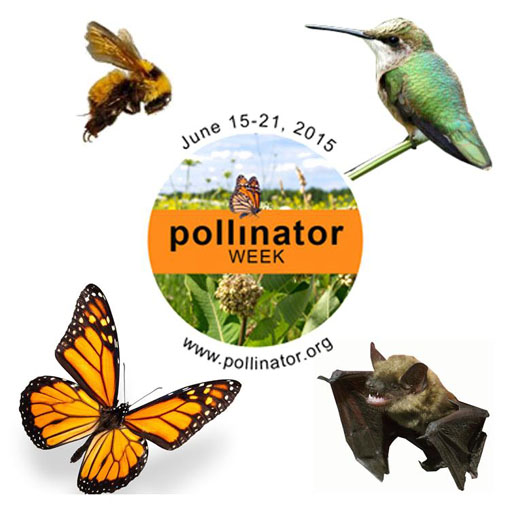This week, June 15-21, 2015, is National Pollinator Week, and we thank the contributions of bees, birds, butterflies and bats– small creatures that play a big yet overlooked role in producing an astounding variety of vegetable and fruit crops that sustain the world.
The USDA says pollinators “help to produce crops like apples, blueberries, strawberries, melons, peaches, potatoes, vanilla, almonds, coffee and chocolate. Without pollinators our diets would lack diversity, flavor and nutrition. An estimated $15 billion worth of crops, including more than 90 fruits and vegetables are pollinated by honey bees alone.”
Here are some ideas to help you support pollinators in your garden:
Plant Milkweed to Help Monarch Butterflies
Monarch butterflies are in great decline and need our help. We have five varieties of Milkweed that Monarch Butterflies particularly prefer as their host plants, right here in our nursery. If you would like to add some to your garden, call our office. We can also obtain Milkweed in larger sizes.
Plant a Pollinator Pocket
This free, informative brochure is offered by University of Illinois Extension, offering tips on planning and planting a small pocket in your garden with suggested perennials that support pollinators.
Leave dead stems over winter
Another tip from the University of Illinois Extension brochure (which we slightly modified) is to leave stems over winter in an out-of-the-way location to provide shelter and nesting areas. This is a good tip for large yards; however, we would not advise this if your neighborhood has rodents.
Mow Your Grass Higher
Also from University of Illinois Extension (and modified), set your mowing blades higher and be ready to welcome clover in the lawn as a groundcover. Clover is a great pollinator plant. If you would rather go lawn-free, convert your lawn to a bed with pollinator plants.
Read Up About Invertebrates
The Xerces Society is a non-profit organization that offers resources and programs that promote the wildlife conservation of invertebrate animals.
Join the Million Pollinator Garden Challenge
The Million Pollinator Garden Challenge is a campaign to register a million public and private pollinator gardens. Read about the challenge and if you’re ready to meet it, be one of the first gardens registered in our community (as of this blog post, there are no private gardens registered near us).
Minimize Use of Pesticides
Chemical pesticides are harmful to pollinators. Consider switching to natural, chemical-free lawn and garden products such as those offered by Gardens Alive. A natural grub control for lawns, for example, is milky spore.

